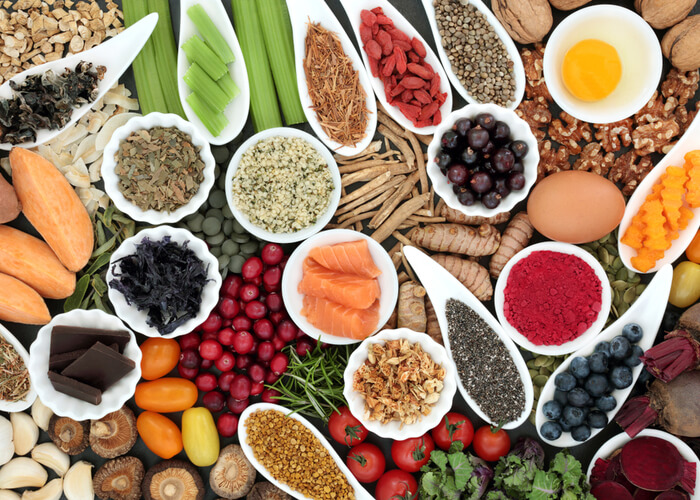A vitamin is an organic substance, which implies it has carbon in it. There are 13 identified vitamins as of right now. Because the body either doesn’t make them or makes very little of them, the majority of vitamins must be obtained through diet.
Vitamin needs vary depending on the organism. Dogs, on the other hand, can create all the vitamin C they require, whereas humans must obtain vitamin C from their food. Vitamin D isn’t present in food in sufficient amounts for humans. The best source of vitamin D is exposure to sunlight, which the body uses to make the vitamin.
Each vitamin has a unique function in the body, and a person needs a distinct quantity of each vitamin to stay healthy.
Fat-soluble and Water-soluble Vitamins
Vitamins can dissolve in either water or fat, depending on their solubility. Below is an explanation of both.
Water-soluble Vitamins
Water-soluble vitamins include vitamin C and all of the B vitamins. They are not stored by the body and do not last very long. They leave the body through the urine. The requirement for water-soluble vitamins is therefore greater than the need for fat-soluble vitamins in daily life.
Fat-soluble Vitamins
Fat-soluble vitamins include A, D, E, and K. The liver and fatty tissue in the body serve as storage locations for the body’s fat-soluble vitamins, which can remain there for days or even months at a time. Through the digestive tract, dietary lipids aid the body in absorbing fat-soluble vitamins.
The 13 Groups of Vitamins
Vitamin A
Chemical name: retinol ,It belongs to the family of chemical compounds known as retinoids.
It is a yellow fat-soluble vitamin
Function: It is an antioxidant vitamin important in vision and bone growth.
Deficiency: This may result in keratomalacia, a condition where the clear front layer of the eye becomes dry and hazy, and night blindness.
Sources: They consist of milk, apricots, cantaloupe melon, carrots, broccoli, sweet potatoes, butter, kale, spinach, liver, some cheeses, and pumpkins.
Vitamin B1
Chemical name: thiamine.
It is water-soluble vitamin found in naturally in some foods, added to foods, and sold as a supplement.
Function: It is necessary for the production of several enzymes that aid in the breakdown of blood sugar.
Deficiency: This may result in Wernicke-Korsakoff syndrome and beriberi.
Sources: Asparagus, kale, cauliflower, potatoes, oranges, liver, eggs, cereal grains, sunflower seeds, brown rice, whole grain rye, and yeast are a few of them.
Vitamin B2
Chemical name: riboflavin.
It is water-soluble.
Function: It aids in the metabolism of food and is necessary for the growth and development of bodily cells.
Signs of deficiency: include mouth fissures and lip irritation.
sources They include green beans, asparagus, bananas, persimmons, okra, chard, cottage cheese, milk, and yogurt.
Vitamin B3
Chemical names: niacin, niacinamide.
It is water-soluble
Niacin is necessary for the body’s cells to grow and function normally.
Deficiency: Low levels lead to pellagra, a condition that causes diarrhea, altered skin, and digestive distress.
Sources: Examples include tofu, lentils, meat, chicken, tuna, salmon, milk, eggs, tomatoes, green vegetables, broccoli, and carrots.
Vitamin B5
Chemical name: pantothenic acid.
It is water-soluble.
Function: It is essential for the production of hormones and energy.
Signs of a deficiency: It include paresthesia, also known as “pins and needles.”
Good sources: Meats, whole grains, broccoli, avocados, and yogurt are a few of these.
Vitamin B6
Chemical names: pyridoxine, pyridoxamine, pyridoxal.
It is water-soluble.
Function: It is essential for the production of red blood cells.
Deficiency: Low levels might cause anemia and peripheral neuropathy.
Sources: They include almonds, bananas, squash, beef liver, and chickpeas.
Vitamin B7
Chemical name: biotin.
It is water-soluble.
Function: Its purpose is to help the body digest carbohydrates, lipids, and proteins. Moreover, it helps to produce keratin, a structural protein found in the skin, hair, and nails.
Deficiency: Insufficient amounts can lead to dermatitis or intestinal irritation.
Good sources: These include egg yolk, liver, broccoli, spinach, and cheese.
Vitamin B9
Chemical names: folic acid, folinic acid.
It is water-soluble.
Functions: It is required for the production of DNA and RNA.
Deficiency: During pregnancy, this may have an impact on the fetus’ neurological system. Doctors advise taking folic acid pills both before and throughout pregnancy. (click here for more on Pregnancy nutrition)
Good sources: These include leafy vegetables, peas, legumes, liver, some fortified grain products, and sunflower seeds. Some fruits also have moderate quantities.
Vitamin B12
Chemical names: cyanocobalamin, hydroxocobalamin, methylcobalamin.
It is water-soluble.
Function: It is necessary for a healthy nervous system.
Deficiency: Low levels can cause neurological issues as well as various forms of anemia.
Good sources: Examples include fish, shellfish, meat, poultry, eggs, milk and other dairy products, fortified cereals, fortified soy products, and fortified nutritional yeast.
Vitamin C
Chemical name: Ascorbic acid.
It is water-soluble.
Function: It helps to produce collagen, heal wounds, and build bones. Moreover, it functions as an antioxidant, boosts the immune system, aids in iron absorption, and strengthens blood vessels.
Deficiency: This could lead to scurvy, which results in bleeding gums, tooth loss, poor tissue growth, and slow wound healing.
Good sources: Fruits and vegetables are among them, however vitamin C is destroyed by cooking.
Vitamin D
Chemical names: ergocalciferol, cholecalciferol.
It is fat-soluble.
Function: It is necessary for the healthy mineralization of bone.
Deficiency: This can result in osteomalacia, or the softening of the bones, and rickets.
Good sources: The body produces vitamin D when exposed to UVB rays from the sun or other sources. The vitamin is also present in fatty fish, eggs, cow liver, and mushrooms.
Vitamin E
Chemical names: tocopherol, tocotrienol.
It is fat-soluble.
Function: Its antioxidant function aids in preventing oxidative stress, a problem that raises the risk of chronic inflammation and different diseases.
Deficiency: This is rare, but it may cause hemolytic anemia in newborns. This condition destroys blood cells.
Good sources: These include leafy greens, vegetable oils, eggs, almonds, kiwis, wheat germ, and nuts.
Vitamin K
Chemical names: menaquinone, phylloquinone.
It is fat-soluble.
Function: It is necessary for blood clotting.
Deficiency: Low levels can result in a bleeding disorder or an exceptional vulnerability to bleeding.
Good sources: These include parsley, figs, pumpkins, leafy greens.
Vitamin Supplements
Several Americans take multivitamins and other supplements, however evidence suggests that these may not be essential or beneficial. The best way to receive all the vitamins you need is from a balanced, varied diet that includes lots of fruits and vegetables. The most effective methods for getting enough nutrients from food are outlined in current guidelines from the Department of Health and Human Services.

However, in some circumstances, such as during pregnancy, for people with limited diets, and for people with particular health conditions, fortified foods and supplements may be acceptable. Those who take supplements should be careful not to go above the recommended dosage because, according to research, consuming too much of any vitamin might have negative health effects.
Vitamin supplements can also interfere with some drugs. In general, it’s necessary to see a doctor before taking any supplements.

Nice work, interesting and comprehensive.